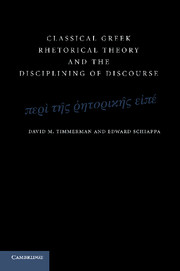
-
Select format
-
- Publisher:
- Cambridge University Press
- Publication date:
- July 2010
- March 2010
- ISBN:
- 9780511750625
- 9780521195188
- 9781107696921
- Dimensions:
- (228 x 152 mm)
- Weight & Pages:
- 0.36kg, 202 Pages
- Dimensions:
- (229 x 152 mm)
- Weight & Pages:
- 0.31kg, 204 Pages
- Subjects:
- Classical Studies, Classical Literature
You may already have access via personal or institutional login- Subjects:
- Classical Studies, Classical Literature
Book description
This book contributes to the history of classical rhetoric by focusing on how key terms helped to conceptualize and organize the study and teaching of oratory. David Timmerman and Edward Schiappa demonstrate that the intellectual and political history of Greek rhetorical theory can be enhanced by a better understanding of the emergence of 'terms of art' in texts about persuasive speaking and argumentation. The authors provide a series of studies to support their argument. They describe Plato's disciplining of dialgesthai into the Art of Dialectic, Socrates' alternative vision of philosophia, and Aristotle's account of demegoria and symboule as terms for political deliberation. The authors also revisit competing receptions of the Rhetoric to Alexander. Additionally, they examine the argument over when the different parts of oration were formalized in rhetorical theory, illustrating how an 'old school' focus on vocabulary can provide fresh perspectives on persistent questions.
Contents
Metrics
Full text views
Full text views help Loading metrics...
Loading metrics...
* Views captured on Cambridge Core between #date#. This data will be updated every 24 hours.
Usage data cannot currently be displayed.
Accessibility standard: Unknown
Why this information is here
This section outlines the accessibility features of this content - including support for screen readers, full keyboard navigation and high-contrast display options. This may not be relevant for you.
Accessibility Information
Accessibility compliance for the PDF of this book is currently unknown and may be updated in the future.


